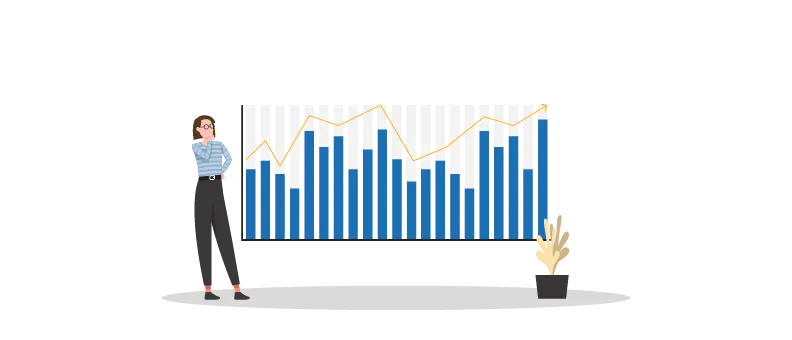How do changing market conditions impact money market funds?


Changing market conditions can have a significant impact on investments vehicles, including money market funds. Interest rate fluctuations, liquidity risk and danger of default are some of the risks that money market funds are exposed to.
In this article, we will examine how changing market conditions impact money market funds and the strategies such funds employ to mitigate risks.
- Table of contents
- What are money market funds?
- Overview of changing market conditions
- How changing market conditions impact money market funds?
- Strategies employed by money market funds to mitigate risks
- FAQs
What are money market funds?
Money market mutual funds invest in short-term debt securities that have a maturity of up to a year, such as commercial papers, treasury bills, certificates of deposit and repurchase agreements. Such funds are considered relatively low-risk investments. This is because of their high liquidity and the short maturities of their underlying securities, which can potentially reduce their exposure to some of the risks of market volatility.
However, like all investments, money market funds are not immune to changing market conditions.
Overview of changing market conditions
Market conditions can change with shifts in the political and economic environment, which can impact market rates and investment returns. These shifts may stem from interest rates changes, inflation, economic growth or slowdown, and geopolitical events.
For instance, an increase in interest rates can lead to a decrease in the prices of fixed-income securities, because prices of debt instruments and interest rates tend to move in opposite directions. This in turn reduces the value of the underlying security and reflects in the net asset value of a mutual funds that invest in them. Meanwhile, an economic slowdown can lead to a decrease in corporate profits and stock prices.
How changing market conditions impact money market funds?
Here are some factors that can influence money market fund returns in changing market conditions:
Interest rate changes: Changes in interest rates, inflation, and economic conditions can impact the returns generated by money market funds. For example, during periods of high inflation, the central bank may hike the interest rate and cause a ripple effect on the performance of money market funds.
Volatility impact: During economic downturns, the value of money market instruments – especially papers that are not of high credit quality – may fluctuate, resulting in increased volatility.
Liquidity risk: Insufficient liquidity can impact the fund’s ability to meet redemption requests or earn sufficient gains. During periods of low liquidity, fund managers may need to employ alternative strategies to generate return potential.
Credit risk: This is the risk that the issuer of a security may default on repayment. This is rare, though not impossible, with money market funds
Strategies employed by money market funds to mitigate risks
The impact on money market fund investment returns in changing market conditions can potentially be mitigated through the following strategies:
Diversification: Fund managers build a diversified portfolio of money market instruments to mitigate risk. This includes investing in a range of instruments such as commercial paper, treasury bills, and certificates of deposit.
Credit risk management: Fund managers employ credit risk management strategies to minimise the risk of default. This includes investing in high-quality instruments and diversifying the portfolio to avoid concentrated exposure to any single issuer.
Conclusion
Money market funds are designed to provide liquidity and mitigate impact on capital invested, but changing market conditions can impact their ability to do so. To mitigate risk or reduce the impact on stability in changing market conditions, fund managers may employ strategies such as diversification, investing in high-quality papers, and liquidity management. By understanding how changing market conditions impact money market funds, investors can make informed investment decisions and potentially achieve their financial goals.
FAQs
What are money market funds?
Money market funds are mutual funds that invest in short-term debt securities with a maturity of a year at most, such as commercial papers, treasury bills, certificates of deposit and repurchase agreements. Such funds are considered to offer high liquidity and relatively stable returns in the short term.
How do changing interest rates affect money market funds?
While generally considered low-risk investments, money market funds are not entirely immune to interest rate fluctuations. Funds with longer average maturities are more sensitive to rate changes, experiencing larger NAV fluctuations. Investors should be aware of this risk.
How do market crashes impact money market funds?
Market crashes can impact the stability of money market funds, resulting in increased volatility. However, money market funds are designed to provide liquidity and mitigate impact on capital invested, and fund managers employ various strategies to mitigate risks.
Mutual Fund investments are subject to market risks, read all scheme related documents carefully.
This document should not be treated as endorsement of the views/opinions or as investment advice. This document should not be construed as a research report or a recommendation to buy or sell any security. This document is for information purpose only and should not be construed as a promise on minimum returns or safeguard of capital. This document alone is not sufficient and should not be used for the development or implementation of an investment strategy. The recipient should note and understand that the information provided above may not contain all the material aspects relevant for making an investment decision. Investors are advised to consult their own investment advisor before making any investment decision in light of their risk appetite, investment goals and horizon. This information is subject to change without any prior notice.